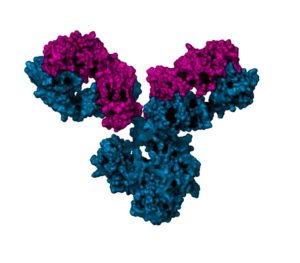Because recombinant protein therapeutics are genetically engineered, they have the potential to induce an immunogenic response in a patient. Immunogenicity risk, as defined by the formation of anti-drug antibodies (ADA), is a significant event that can compromise patient safety and ultimately sink a biologics program. With the increasing number of recombinant protein therapeutics in development, there is a need for a tool that can be applied early in development to predict ADA formation. To better understand and predict immunogenicity, researchers are reviewing data on pre-existing reactivity; however it remains unknown if pre-ADA (immunoglobulins pre-existing in patient serum that cross-react with biotherapeutics without exposure) predicts true ADA development during treatment. Nicoletta Bivi and colleagues from Eli Lilly recently described the use of ADA assays to predict ADA-like responses using a bispecific antibody (IgG-scFv) with serum from treatment-naïve, healthy human donors, and they were able to compare their results to the incidence of treatment-emergent ADA reactivity in patients. They demonstrate that the scFv domain is the ADA-reactive epitope and that the domain specificity of pre-existing ADA is the same as that of the treatment emergent-ADA. Bibi et al. propose that evaluating the magnitude and domain specificity of pre-existing reactivity is a powerful tool to understand the immunogenic potential of novel biotherapeutics.
To read the article, please refer to, “Investigation of pre-existing reactivity to biotherapeutics can uncover potential immunogenic epitopes and predict immunogenicity risk,” authored by Nicoletta Bivi, et al. in mAbs, 11 (5), 861-869, May 2019. PMID: 31099718
Chamow & Associates assists companies to develop biologics for clinical testing and welcomes your inquiry.
Posted July 10, 2019





